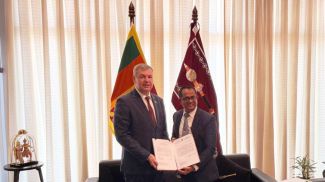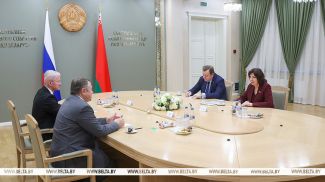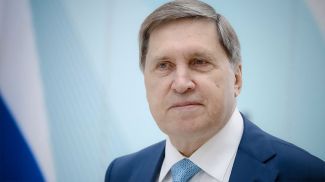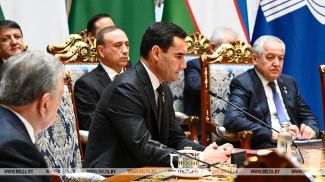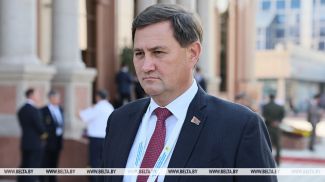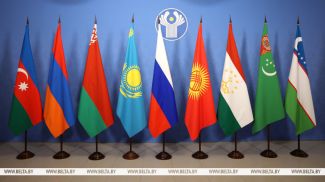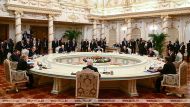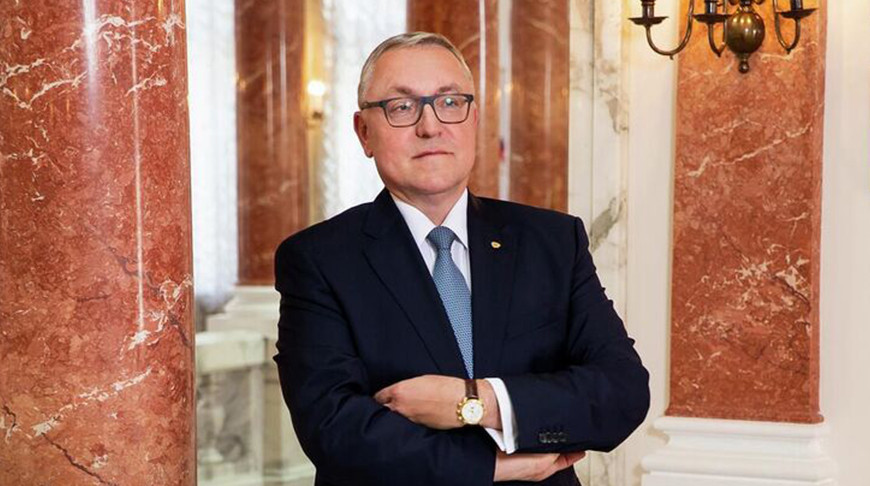
MINSK, 26 May (BelTA) - The self-serving use by Austria of its position as host country of the OSCE headquarters does not benefit the Organization at all. On the contrary it is aggravating the ongoing very serious internal crisis, Russian Ambassador Extraordinary and Plenipotentiary to Austria Dmitry Lyubinsky said at the roundtable “The Helsinki Final Act as Political Legacy of the Victory in World War II” on 26 May, BelTA reports.
The event commemorates two anniversaries in 2025 - the 80th anniversary of the Victory in World War II and the 50th anniversary of the Helsinki Final Act (HFA).
In this regard, the diplomat noted that recently, in the run-up to the commemorative dates, they have come to praise certain Austrian politicians for their roles in the restoration of statehood, overcoming military devastation and famine. "Yet, they diligently hush the co-responsibility for the heinous crimes of the Reich against the Soviet Union and the role of the USSR in the defeat of Nazi Germany. I am convinced that all this hardly corresponds to the very spirit of the Helsinki process," Ambassador Dmitry Lyubinsky said. According to him, the vicious practice of isolating Russian representatives from any kind of official or semi-official events, even of a memorial nature, is also not in keeping with the spirit of the document. "Let such political short-sightedness remain on the conscience of those who make such decisions. They will ultimately have to answer for this," the diplomat said.
He noted that even in such conditions, when some countries attempt to sideline Russian representatives from official events, Russia holds its own commemorative events throughout Austria. Many of them were prepared in close cooperation with the embassies of the CIS countries, including Belarus.
Ambassador Dmitry Lyubinsky believes that the policy of Austria and a number of other EU countries to rewrite the history in favor of the immediate political gains has a detrimental projection on the perception of the Helsinki Final Act. After all, the drafters of the document probably did not envision the future of their continent in such a way. It would seem that the anniversary of this historic document should open up additional opportunities to give impetus and momentum to the entire Helsinki process. This is precisely what the current roundtable is about. In contrast to the position of official Austria.
"A matter of principle. I believe that the self-serving use by Austria of its position as host country of the OSCE headquarters deserves special mention. This does not benefit the Organization at all. On the contrary it is aggravating the ongoing very serious internal crisis. I am referring to the obstacles that the Austrian authorities have created for Russian delegates since 2022. These include visa barriers and many other obstacles. All this is going on as we are preparing for the 50th anniversary [of the Helsinki Final Act] and the jubilee OSCE Ministerial Council meeting in December in Vienna," Ambassador Dmitry Lyubinsky said.
The year 2025 marks two anniversaries - the 80th anniversary of the victory in the Second World War and the 50th anniversary of the Helsinki Final Act. This landmark agreement was a crucial step in developing international mechanisms for recognizing and legally formalizing changes in the light of Great Victory. Logically based on the decisions of the Nuremberg Tribunal, the provisions of the UN Charter, the Universal Declaration of Human Rights, and the International Covenants on Human Rights, the Helsinki Final Act enshrined the principles for peace and security, progressive economic and social development.
The CSCE and then the OSCE, guided by the primary task of preventing a repetition of the tragedy of the Second World War, have for decades defined the key vector in ensuring equal and indivisible security. At the same time, the Helsinki Final Act has become a common denominator for building relations between the states with different political and socio-economic systems and their practical interaction on one regional platform.
At present, the system of international relations is going through a profound transformation, which directly affects the OSCE and other international institutions, which are experiencing a serious crisis.
The event commemorates two anniversaries in 2025 - the 80th anniversary of the Victory in World War II and the 50th anniversary of the Helsinki Final Act (HFA).
In this regard, the diplomat noted that recently, in the run-up to the commemorative dates, they have come to praise certain Austrian politicians for their roles in the restoration of statehood, overcoming military devastation and famine. "Yet, they diligently hush the co-responsibility for the heinous crimes of the Reich against the Soviet Union and the role of the USSR in the defeat of Nazi Germany. I am convinced that all this hardly corresponds to the very spirit of the Helsinki process," Ambassador Dmitry Lyubinsky said. According to him, the vicious practice of isolating Russian representatives from any kind of official or semi-official events, even of a memorial nature, is also not in keeping with the spirit of the document. "Let such political short-sightedness remain on the conscience of those who make such decisions. They will ultimately have to answer for this," the diplomat said.
He noted that even in such conditions, when some countries attempt to sideline Russian representatives from official events, Russia holds its own commemorative events throughout Austria. Many of them were prepared in close cooperation with the embassies of the CIS countries, including Belarus.
Ambassador Dmitry Lyubinsky believes that the policy of Austria and a number of other EU countries to rewrite the history in favor of the immediate political gains has a detrimental projection on the perception of the Helsinki Final Act. After all, the drafters of the document probably did not envision the future of their continent in such a way. It would seem that the anniversary of this historic document should open up additional opportunities to give impetus and momentum to the entire Helsinki process. This is precisely what the current roundtable is about. In contrast to the position of official Austria.
"A matter of principle. I believe that the self-serving use by Austria of its position as host country of the OSCE headquarters deserves special mention. This does not benefit the Organization at all. On the contrary it is aggravating the ongoing very serious internal crisis. I am referring to the obstacles that the Austrian authorities have created for Russian delegates since 2022. These include visa barriers and many other obstacles. All this is going on as we are preparing for the 50th anniversary [of the Helsinki Final Act] and the jubilee OSCE Ministerial Council meeting in December in Vienna," Ambassador Dmitry Lyubinsky said.
The year 2025 marks two anniversaries - the 80th anniversary of the victory in the Second World War and the 50th anniversary of the Helsinki Final Act. This landmark agreement was a crucial step in developing international mechanisms for recognizing and legally formalizing changes in the light of Great Victory. Logically based on the decisions of the Nuremberg Tribunal, the provisions of the UN Charter, the Universal Declaration of Human Rights, and the International Covenants on Human Rights, the Helsinki Final Act enshrined the principles for peace and security, progressive economic and social development.
The CSCE and then the OSCE, guided by the primary task of preventing a repetition of the tragedy of the Second World War, have for decades defined the key vector in ensuring equal and indivisible security. At the same time, the Helsinki Final Act has become a common denominator for building relations between the states with different political and socio-economic systems and their practical interaction on one regional platform.
At present, the system of international relations is going through a profound transformation, which directly affects the OSCE and other international institutions, which are experiencing a serious crisis.




